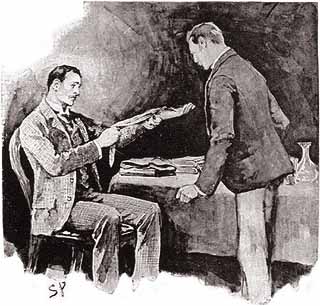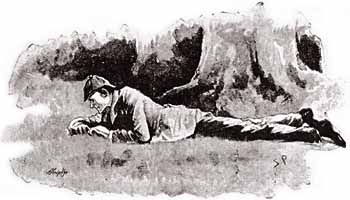“Your work is going to fill a large part of your life, and the only way to be truly satisfied is to do what you believe is great work. And the only way to do great work is to love what you do. If you haven’t found it yet, keep looking. Don’t settle. As with all matters of the heart, you’ll know when you find it. And, like any great relationship, it just gets better and better as the years roll on. So keep looking until you find it. Don’t settle.” (Steve Jobs)
Sherlock Holmes’s universe—the mental spaces that he occupied—was famously narrow. If a piece of information wasn't in some way relevant to whatever case or mystery he was pursuing at the moment, then it wasn’t relevant at all. In A Study in Scarlet, when Dr. Watson takes the Detective to task for not knowing that the Earth revolves around the sun, the Detective snaps: “What the deuce is it to me? …you say that we go round the sun. If we went round the moon it would not make a pennyworth of difference to me or to my work.” The 2010 BBC series, “Sherlock,” featured a variation on the line, with the title character saying: “Oh hell, what does [the solar system] matter? So we go round the sun. If we went round the moon or round and round the garden like a teddy bear it wouldn't make any difference. All that matters to me is the work. Without it my brain rots.”
Sherlock Holmes had clearly defined, carefully cultivated priorities. In “The Bruce-Partington Plans,” he says: “I play the game for the game’s own sake.” He worked neither for money nor for public acclaim, and was openly antagonistic towards Watson’s literary efforts on his behalf, even though the Doctor’s stories must have certainly brought a tremendous number of clients to the door of 221B Baker Street. Holmes also does not care if the police or other parties receive the credit for solving the case, as the long as the case is solved. In “The Naval Treaty,” Holmes says to an unreasonably vexed police inspector: “On the contrary…out of my last fifty-three cases my name has only appeared in four, and the police have had all the credit in forty-nine. I don’t blame you for not knowing this, for you are young and inexperienced, but if you wish to get on in your new duties you will work with me and not against me.” Sherlock Holmes understood his priorities, and likewise, he knew how to cultivate them in others.
On the other hand, John Watson is a medical man, a surgeon, by trade. Though that character detail is often easy to forget given the amount of time that he spends running beside, and chasing after, Sherlock Holmes. He abandons his medical practice frequently—sometimes with his wife’s encouragement—and with little notice, foisting his patients onto an unsuspecting colleague—whom must certainly have benefited from the constant influx of business. Truly, it appears that Watson spent most of his time as the Great Detective’s biographer and partner, but he must have found some spare moments to be the doctor that he trained to be. In “The Creeping Man,” the reader finds that Watson cannot get away and follow Holmes as easily as he used to do: “Monday morning found us on our way to the famous university town–an easy effort on the part of Holmes, who had no roots to pull up, but one which involved frantic planning and hurrying on my part, as my practice was by this time not inconsiderable."
 |
| Dr. John Watson seen here in "The Adventure of the Engineer's Thumb," offering some practical advice to a patient whose thumb is missing...brandy, naturally. |
How and when Watson found the time to build up a medical practice is beside the point, because he did find it. Additionally, no matter how difficult it eventually became for Watson to get away and follow Holmes, he does manage to get away. Even after the Great Hiatus, during which time Watson would have had three years to cultivate his own practice, and again establish himself as the doctor he was trained to be, he is quick to sell his business, move back to Baker Street, and throw his lot back in with Sherlock Holmes once again:
“At the time of which I speak, Holmes had been back for some months, and I at his request had sold my practice and returned to share the old quarters in Baker Street. A young doctor, named Verner, had purchased my small Kensington practice, and given with astonishingly little demur the highest price that I ventured to ask–an incident which only explained itself some years later, when I found that Verner was a distant relation of Holmes, and that it was my friend who had really found the money” (NORW).
So, for all that Dr. Watson judged his friend for not knowing that the Earth revolved around the sun (“But the Solar System!” [STUD]) simply because it was irrelevant to his work, Sherlock Holmes does not judge his friend for abandoning his prosperous practice to pursue a man who has inexplicably begun imitating a monkey. Possibly because he was encouraging the behavior, as he does by having a relative purchase Watson’s practice, but also he knows that Watson’s priorities are the same as his own, and he has no issues with making sure that they remain so.
At the recent annual formal dinner hosted by Watson’s Tin Box, author Lyndsay Faye quoted John le Carré and said: “No one writes of Sherlock Holmes without love.” I’ve been thinking a lot about the nature of work lately, Sherlockian work in particular—the why and how of why Sherlockians do what they do. And I wonder if the Great Detective and Doctor Watson provided their readers with an example of how to pattern and organize their priorities, to remind the reader of why they read.
Sherlock Holmes “[worked] as he did rather for the love of his art than for the acquirement of wealth, he refused to associate himself with any investigation which did not tend towards the unusual, and even the fantastic” (SPEC). And Dr. Watson had a vocation that he occasionally fell back upon, but had no issues with abandoning it when it was no longer what he wanted. When Sherlock Holmes reappeared in Dr. Watson’s life—whole and alive—the Doctor knew without question where he wanted to be. The canon is filled with examples of working for the love of the work, of people who loved what they did. And I think they would be disappointed if their devotees behaved any differently, if we found ourselves writing of Sherlock Holmes without joy, enthusiasm, or love.
oOo
“Better Holmes & Gardens” now has its own Facebook page. Join by “Liking” the page here, and receive all the latest updates, news, and Sherlockian tidbits.


Exceptionally interesting to make the connection between what motivated the work of those within the canon (Holmes's clients, Holmes's faithful friend and colleague, and Holmes himself) and what still motivates the extracanonical work of Holmes's faithful devotees. Wonderful to recover from your reading and research an ethos of work that transfers so seamlessly to life, especially a life that makes room for passionate work on the Sherlockian worldview.
ReplyDelete@Lucy: Thank you so much! The *how* and *why* of the nature of work seems to be a recurring theme in the canon, and it was one that I was particularly inspired to explore. I'm so glad that you enjoyed it!
ReplyDelete